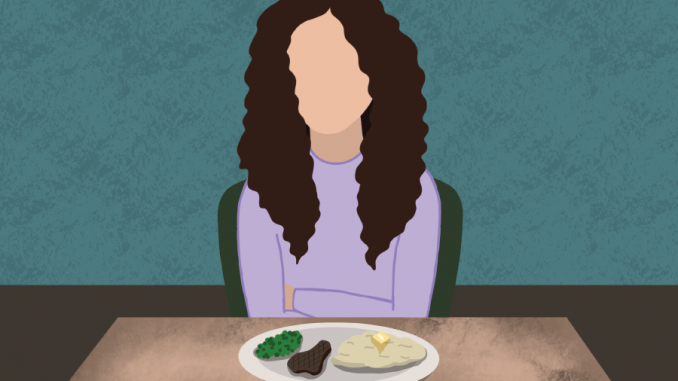
CONTENT WARNING: This story contains mentions of eating disorders that may be uncomfortable for some readers.
Living on campus did wonders for my self-esteem and self-worth.
Starting a new chapter of my life in a more accepting environment helped me appreciate my body and begin a journey toward eating and exercising intuitively: eating exactly what my body is telling me to eat and working out when I feel like moving.
Last spring was the best semester yet. Surrounded by my supportive friends and boyfriend, I was eating whatever I wanted and exercising on my own terms.
I found myself in my childhood bedroom last March after the COVID-19 pandemic forced me to move home. Being back in my hometown of Westwood, New Jersey, where my eating disorder flourished in my later years of high school, I was more than nervous: I was devastated.
The first few months at home were spent laying in bed with more time than I desired. I felt trapped and purposeless, especially because it was during the most isolating moments of quarantine. I spent a lot of time alone, and eating disorders thrive in loneliness.
I started having negative thoughts about the way my body looked. Soon, with all of my newfound free time, I resorted to old habits, like counting calories and overthinking about food and exercise. Because I was stuck inside, I felt lazy and pressured myself to work out and eat only healthy, guilt-free foods.
My anxiety took over me. For a while, focusing on fitness and trying to change my body was the only way I spent my time.
Then, last May, I found a way to take a step back from how I was feeling and look outward. I finally saw the bigger picture and realized my personal struggles were justified because of how much I had been through.
I reminded myself that we were living through a pandemic, and it was okay to feel lost and overwhelmed. My body kept me healthy in the time it needed it most, during a pandemic.
For the first time in my life, I realized how lucky I was to be alive and healthy.
I worked toward eliminating negative thoughts and speaking to myself in ways that made me feel worthy and strong. I woke up and started my days by looking in the mirror and telling myself I was beautiful and doing the best I could. I knew I could — and would — get through this.
I began exercising, not for results, but for bouts of fresh air in my day. It reduced my stress and gave me a chance to go outside and breathe.
As restrictions on gatherings and businesses were slowly lifted and I was able to see my close friends, family and boyfriend again, I stopped restricting my diet as well. Maintaining my recovery and forgiving myself became easier.
I moved back to Philadelphia in August 2020. Once I was back at Temple and returned to a fairly normal routine, I felt more grounded in my appreciation of my body.
To say that every day in my recovery was effortless would be a lie. There is still so much uncertainty in the world, and between online learning, burnout, financial worries and the ongoing pandemic, it can be hard to balance self-care with everything else.
When I’m feeling guilty about missing a workout or treating myself to some Ben & Jerry’s, I remind myself of what the past year threw at me and everyone else.
If my body managed to get me through the year we had, it is a beautiful and healthy body, and I should appreciate it for what it does for me, not scrutinize the things that aren’t perfect.


Be the first to comment